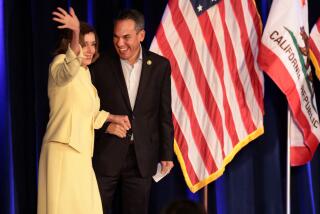Pelosi will step down as House Democratic leader

After months of speculation, Speaker Nancy Pelosi said she would not seek to lead House Democrats for another term.
WASHINGTON — After months of speculation about her future, House Speaker Nancy Pelosi (D-San Francisco) said Thursday she would not seek to lead House Democrats for another term but would remain in Congress.
The decision — capping a 35-year career in which Pelosi became the most powerful woman in Congress in U.S. history — followed her party’s narrow loss of the chamber in last week’s midterm election.
Pelosi is abiding by her 2018 agreement with fellow Democrats to step down from leadership by the end of 2022 to make way for younger leaders.
“For me, the hour’s come for a new generation to lead the Democratic caucus that I so deeply respect,” Pelosi said in a House floor speech.
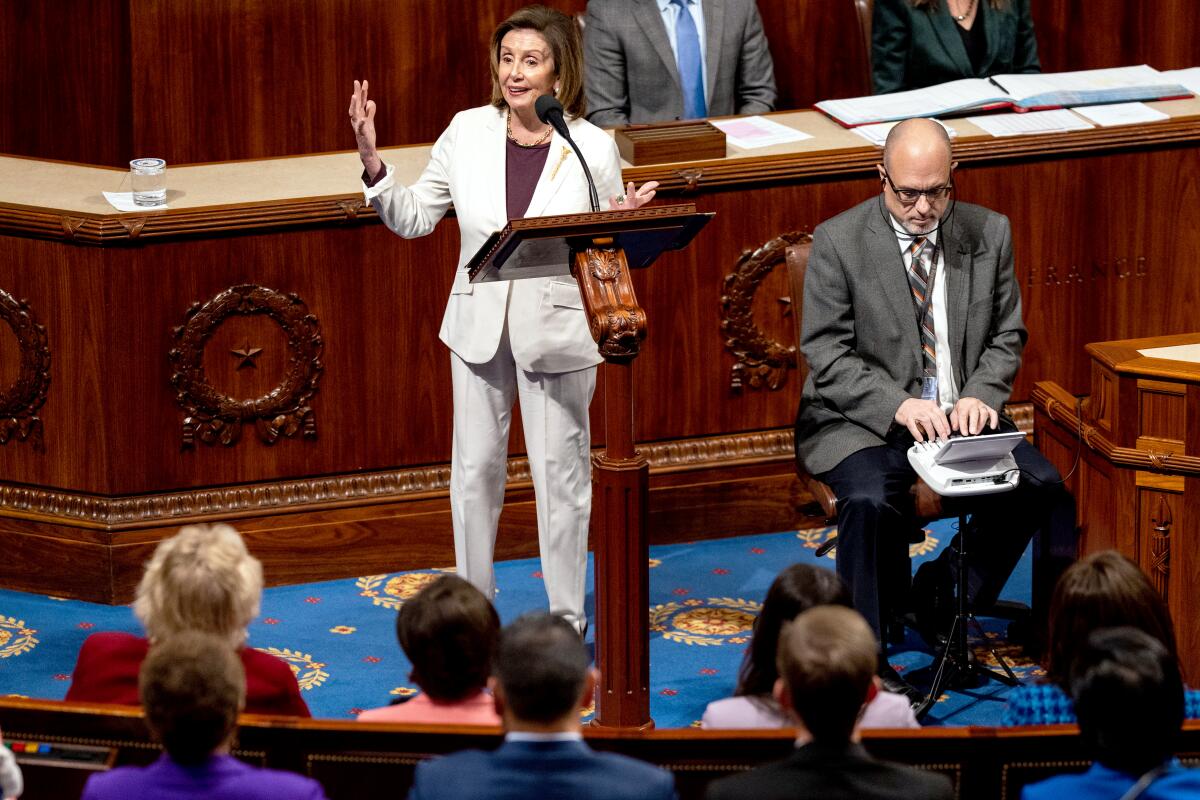
President Biden, who spoke with Pelosi on Thursday morning, later called her the “most consequential speaker of the House of Representatives in our history.”
“With her leading the way, you never worry about whether a bill will pass,” Biden said. “If she says she has the votes, she has the votes. Every time.”
The nation’s first and only female House speaker, Pelosi is stepping aside despite the strong urging of many of her colleagues to remain.
She told a small group of reporters in an interview after her remarks that her phone had been “exploding” in recent days with members telling her she must run for leadership again.
Under Pelosi’s stewardship this year, House Democrats defied expectations that the party would suffer steep losses in the midterm. Instead, Republicans gained only a slim majority of the House.
“She will be one of the giants of American history,” said Rep. Debbie Dingell (D-Mich.).
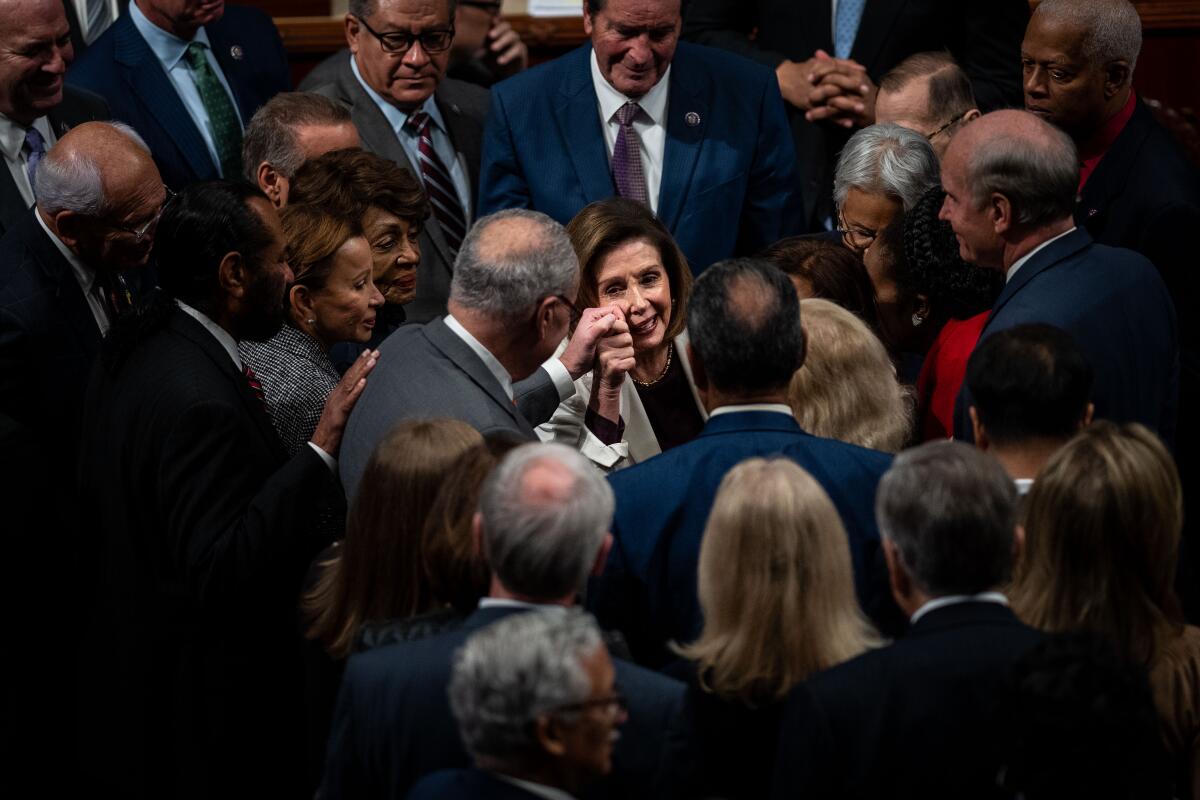
Had Pelosi wanted to remain as House minority leader, she likely could have, despite the 2018 agreement. But she said she felt “balanced” over her decision, not sad.
Though many Democrats previously voiced a desire for Pelosi, 82, to hand over the reins to younger lawmakers, her success in combating the Trump administration and then aiding the Biden administration had since won over many of those critics.
She said in the interview that if she could have done anything differently during her time in leadership, it would’ve been to win more elections to keep Republicans, including former President Trump, out of power.
Pelosi said that last month’s attack on her husband, Paul Pelosi, was a factor in her decision, but that the incident had also strengthened her resolve to remain in Congress rather than let her foes drive her out.
“I couldn’t give them that satisfaction,” she said.
The speaker’s husband was assaulted with a hammer by a man who broke into their San Francisco home aiming to hurt her, police said. She was in Washington at the time. Her husband is expected to face a long recovery.
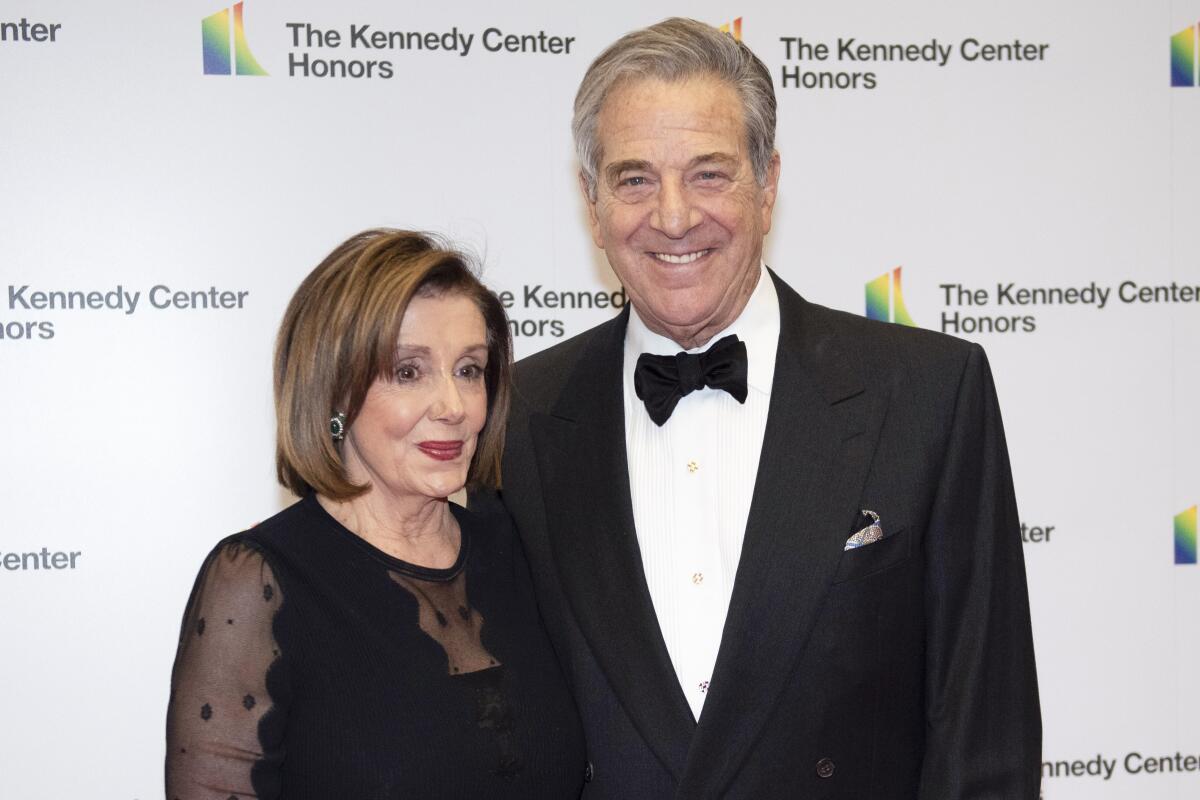
She said that she has survivor’s guilt and that the attack was traumatic for her entire family.
“This happened in our house,” she said. “It made our home a crime scene.”
Democrats said her experience, knowledge and fundraising skills would continue to prove helpful, even when she is no longer in a leadership position.
“It’s going to take all of us working together to compensate for losing her from our leadership,” said Rep. Adam B. Schiff (D-Burbank). “And I’m sure she’s going to continue to be very active in helping our party and helping our caucus. It’s not like she’s vanishing from the Congress.”
But Pelosi downplayed any advisory role she might play, saying she rarely asked for advice as leader and won’t be disappointed if her successors don’t either.
Drawing a comparison to the upcoming Thanksgiving holiday, she said: “I have no intention of being the mother-in-law in the kitchen, saying: ‘My son doesn’t like the stuffing that way. This is the way we make it.’ [The new House Democratic leaders] will have their vision. They will have their plan, and I think that the authenticity of all of that will be respected.”
She said she would not serve on a committee and was reluctant to return to the time-consuming process of fundraising.
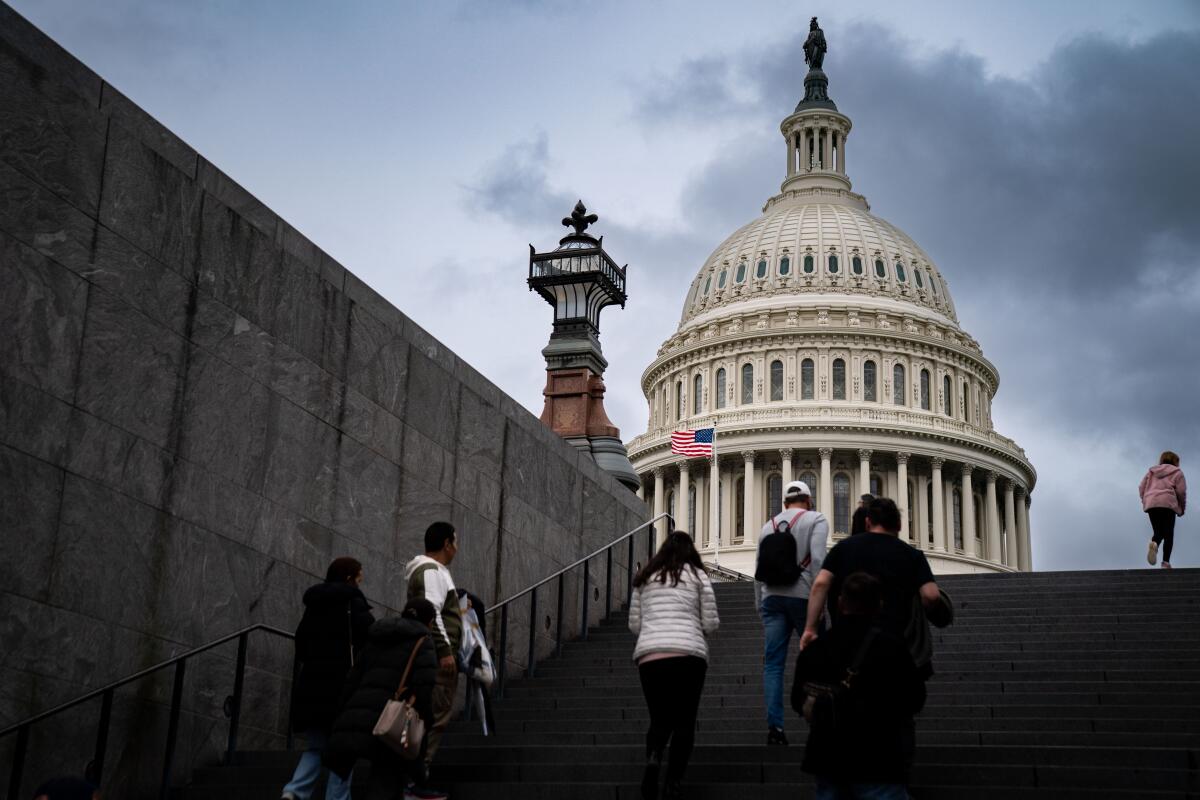
Rep. Emanuel Cleaver II (D-Mo.) said that Democrats should move quickly to fill her post.
“Whoever replaces her — and we have some great people who could step up to the plate — they’re going to have to start working out immediately so they’ll have the muscle and the energy to do what she’s done almost effortlessly,” Cleaver said.
“I’m not happy about it,” he said of Pelosi stepping down. “But like me, I think everyone — the speaker included — recognizes at some point we have a limited lifetime. And I think you give all you can and then you try to live out the rest of your
life as conflict-free as you can, and nobody can blame her for leaving.”
The race to replace Pelosi had occurred quietly behind the scenes for months, but appeared to largely settle itself shortly after her announcement. House Democrats will hold internal leadership elections on Nov. 30.
Rep. Hakeem Jeffries (D-N.Y.) is favored to become the next Democratic leader.
Pelosi’s top lieutenants, House Majority Leader Steny H. Hoyer, 83, of Maryland and Majority Whip James E. Clyburn, 82, of South Carolina, had previously expressed interest in succeeding her, but both said Thursday that they would stand aside for new leadership.
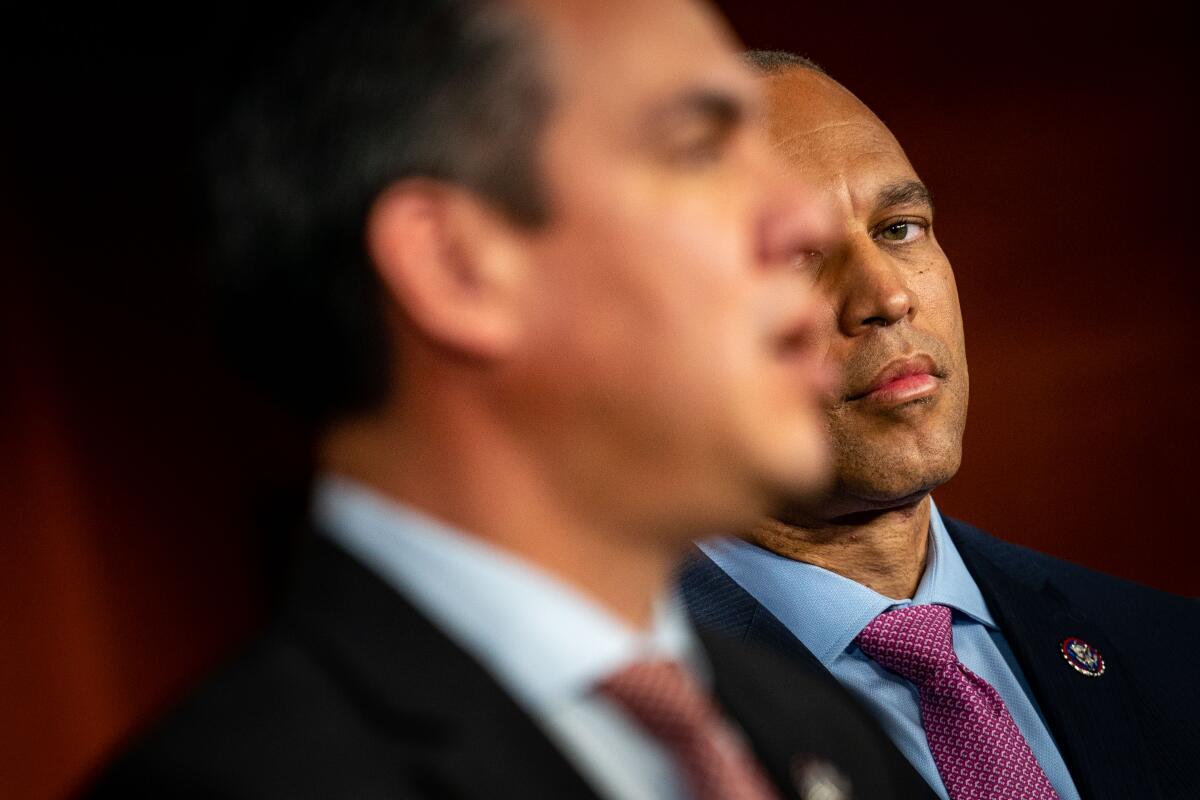
“I will be supporting Jeffries for leader,” Clyburn said.
Pelosi said she didn’t plan to endorse a successor, saying it would be important to their legitimacy that they win the post on their own.
“I don’t think it’s up to me to make that anointment, although I probably know better than anybody what that job requires,” she said.
Schiff reportedly had interest in becoming the top Democrat but decided to
focus instead on a potential Senate campaign. California Democratic Sen. Dianne
Feinstein hasn’t said whether she’ll seek reelection in 2024. Schiff declined to comment on the report.
Retiring Rep. Alan Lowenthal (D-Long Beach) called Pelosi “probably the most outspoken and powerful woman in United States politics,” and said that “it’s going to be very hard to replace her, to have that kind of leadership” again.
The speaker’s gavel is likely to go next to another Californian — House GOP leader Kevin McCarthy of Bakersfield.
The Bakersfield congressman’s ideological flexibility, fundraising prowess and management of Donald Trump have helped him hold House Republicans together as they head into the midterm elections. Now he’s on the verge of gaining the prize he has long desired.
McCarthy became the front-runner in the race after Republicans secured the minimum 218 seats needed for a majority on Wednesday. The next speaker will be
selected when the new Congress convenes in January.
If McCarthy is elected, Pelosi said, she won’t formally hand off the gavel to him, because it is passed from leader to leader, and by then Democrats will have elected her successor.
Pelosi has been called one of the most effective House speakers in history. She has served as speaker under every U.S. president since George W. Bush.
She muscled the largest healthcare reform in generations, the 2010 Affordable Care Act, through the House. She called passage of the act, widely known as Obamacare, “the biggest thing that [she’d] ever done in Congress,” but added that passing this year’s Inflation Reduction Act was also “very, very essential and satisfying” for her.
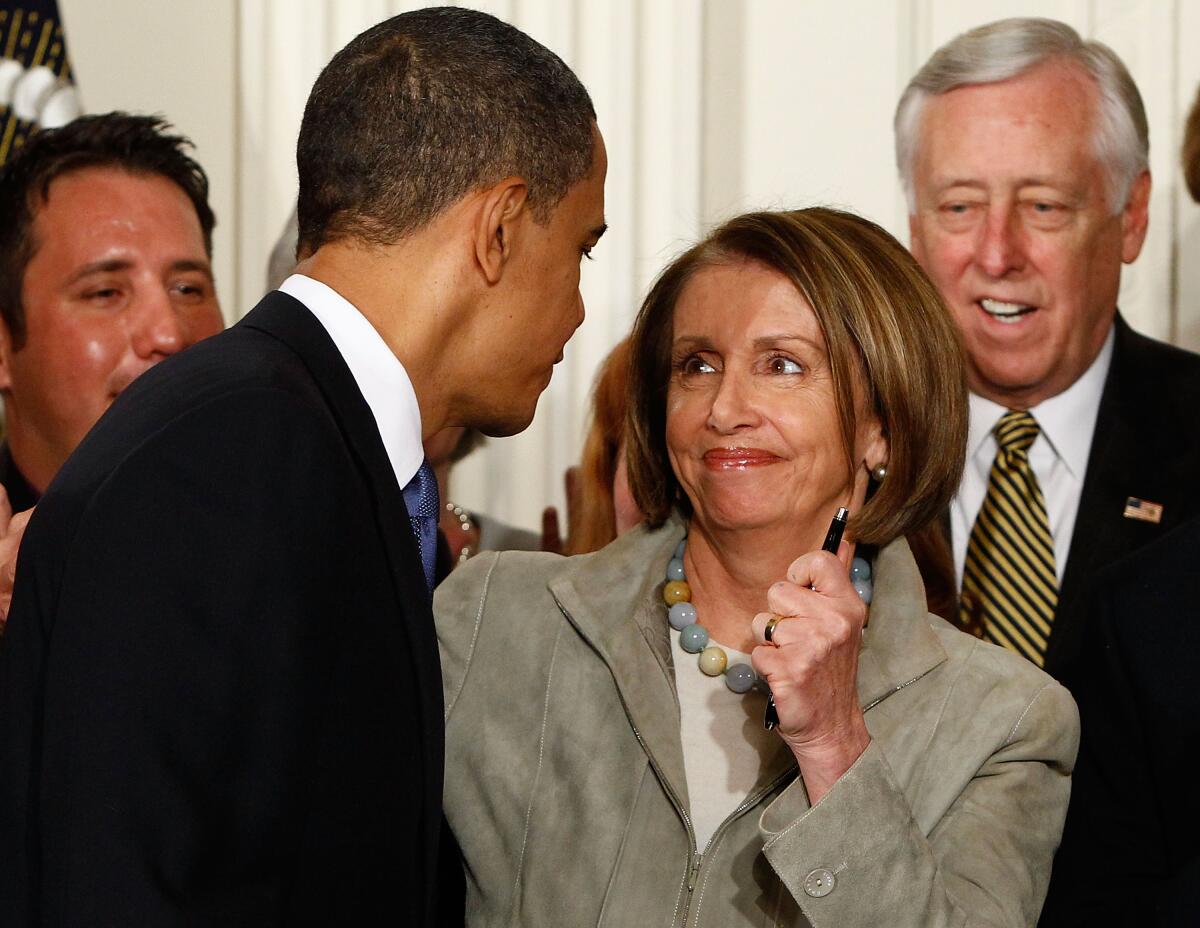
Pelosi also led both Trump impeachments; kept her caucus united to pass massive, multitrillion-dollar legislation to stabilize the economy during the COVID-19 pandemic; and helped push through last year’s $1-trillion infrastructure package.
Born into a prominent Baltimore political family, Pelosi began her career as an elected official in 1987.
She was known in her early years in the House as a fierce advocate for a strong government response to HIV/AIDS, a topic that at the time was largely taboo or ignored, but was exceedingly important to Pelosi’s many gay constituents in San Francisco.
She was first elected to leadership in 2001, beating out Hoyer to become minority whip. He remains her second in command. In 2003, she became minority leader, the highest position possible in the House without her party holding a majority.
After Democrats took control of the chamber in 2006, Pelosi was selected in January 2007 as the first female speaker of the House.
Republicans have long seized on Pelosi’s prominence, flooding the airwaves for years with hundreds of millions of dollars’ worth of attack ads deriding her as a “San Francisco liberal” and warning that other Democratic candidates would support her positions.
In her San Francisco-based district, Pelosi has consistently won reelection by large margins. One of the Democratic Party’s most prodigious fundraisers, she raised $310 million for Democrats this cycle and $1.28 billion since entering leadership in 2002.
Her ability to get under Republicans’ skin was never more apparent than during the four years that Trump was president. She gained a new generation of fans for her ability to rattle him.
Pelosi made history again with his 2019 and 2021 impeachments, becoming the first speaker to preside over such proceedings twice.
Times staff writer Sarah D. Wire contributed to this report.
More to Read
Get the L.A. Times Politics newsletter
Deeply reported insights into legislation, politics and policy from Sacramento, Washington and beyond. In your inbox three times per week.
You may occasionally receive promotional content from the Los Angeles Times.



